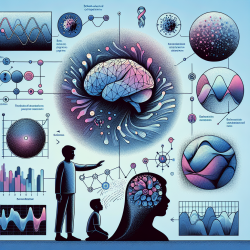Introduction
The cerebellum, traditionally associated with motor control, has been increasingly recognized for its role in cognitive processes. The research article titled Cognitive Dysfunction following Cerebellar Stroke: Insights Gained from Neuropsychological and Neuroimaging Research provides valuable insights into how cerebellar strokes can lead to cognitive impairments. This blog aims to translate these findings into practical applications for practitioners, particularly those involved in cognitive rehabilitation and speech-language pathology.
Understanding Cerebellar Cognitive Impairments
The study identifies a spectrum of cognitive deficits following cerebellar strokes, primarily characterized by executive function disturbances. These include challenges in planning, abstract reasoning, and verbal fluency. The research highlights the disruption of the cerebro-cerebellar loop, which is crucial for cognitive processing. This disruption can manifest in various cognitive impairments, including:
- Visual-Spatial Cognition: Difficulties in visual-spatial tasks such as picture arrangement and mental rotation.
- Language: Subtle language impairments, including reduced verbal fluency and grammatical issues.
- Working Memory: Challenges in maintaining and manipulating information during cognitive tasks.
- Executive Function: Deficits in attention, task management, and planning.
Implications for Practitioners
Practitioners can leverage these findings to enhance their therapeutic approaches. Here are some actionable strategies:
- Targeted Cognitive Rehabilitation: Develop individualized therapy plans that focus on the specific cognitive deficits identified in cerebellar stroke patients.
- Utilize Neuroimaging Insights: Incorporate neuroimaging data to better understand the structural and functional changes in the cerebellum, allowing for more precise interventions.
- Implement Specific Assessments: Use tools like the Cerebellar Cognitive Affective Syndrome (CCAS) scale to detect cognitive changes and tailor interventions accordingly.
Encouraging Further Research
The study opens avenues for further research into the cerebellum's role in cognition. Practitioners are encouraged to engage in research initiatives that explore:
- The long-term cognitive outcomes of cerebellar stroke patients.
- The efficacy of novel rehabilitation techniques, such as non-invasive brain stimulation, in improving cognitive functions.
- The potential for personalized therapy based on neuroimaging findings.
Conclusion
The insights gained from this research provide a foundation for enhancing therapeutic practices and improving outcomes for children and adults affected by cerebellar strokes. By integrating these findings into practice, practitioners can contribute to a deeper understanding of cerebellar cognition and offer more effective rehabilitation strategies.
To read the original research paper, please follow this link: Cognitive Dysfunction following Cerebellar Stroke: Insights Gained from Neuropsychological and Neuroimaging Research.










